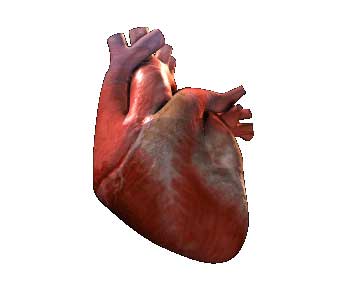“What Is A Normal Ejection Fraction Value?” Asks Simone
By Adam Pick on November 25, 2008
I just received a question from Simone about her 66-year old father. Her email reads, “Hi Adam – My father was just diagnosed with severe mitral regurgitation. This is a very stressful time. His cardiologist rattled off a bunch of terms and numbers which suggested valve replacement. One of those terms was ejection fraction (I think). What does that mean? Are there normal ejection fraction values? Is there a normal ejection fraction range? Thanks, Simone”
This is a great question. So you know, I didn’t fully understand the ejection fraction values until I was in cardiac rehabilitation. When I reviewed my post-op echocardiogram with Debbie, the head nurse at cardiac rehab, she explained it to me.

The ejection fraction is a measurement of the capacity at which your heart is pumping. According to the Mayo Clinic, during each heartbeat cycle, the heart contracts and relaxes. When your heart contracts, it ejects blood from the two pumping chambers (ventricles). When your heart relaxes, the ventricles refill with blood. No matter how forceful the contraction, it doesn’t empty all of the blood out of a ventricle. The term “ejection fraction” refers to the percentage of blood that’s pumped out of a filled ventricle with each heartbeat.
Because the left ventricle is the heart’s main pumping chamber, ejection fraction is usually measured only in the left ventricle (LV). A normal ejection fraction value for the left ventricle is 55 to 70 percent. Your ejection fraction value may decrease if your heart has been damaged by a heart attack or other problems with the heart valves or muscle.
I hope that helps Simone (and perhaps you) learn more about normal ejection fraction values and ranges!
Keep on tickin!
Adam
|
Mary Graves says on January 12th, 2009 at 1:48 pm |
|
Hi, I had my echo done last fall and the doctor said I had a glob in front of the heart, but not on the heart nor in the sack….he did a CT scan of the chest which did not show anything and then did a CT scan of the heart, which also showed nothing, including no calcification in the heart and the valves looked fine. He also said my heart is pumping at 80+ percent, which he felt was wonderful for a 72 year old female. Has anyone else been told that they have a glob of something in front of the heart, but no one knows what it is? The cardiologist said it was there four years ago and had only gotten a little larger in four years and it did not seem to be pressing on the heart…still a little nerve racking. |
 |
|
Steve Troute says on March 30th, 2010 at 7:08 pm |
|
I just had a cardiac echo and my ejection fraction value was 79, what exactly does that mean. I was told my heart was normal with no visible abnormalities. Your reply will be greatly appreciated. Steve |
 |
|
Anuj says on August 8th, 2011 at 7:29 am |
|
Hi.. My Father heart Ef Is 20 % what it means … Is here any serious problem help me out please.. reply soon Anuj |
 |
|
Mazhar ALI says on June 15th, 2012 at 2:12 am |
|
Hi, My father ejection fraction is 37%, and a Heart rate betwee 130 -138 per minute, does it mean a cardiac failure. Previously he had a tuber closes and was observing short of breaths. now though he has recovering from Tubercloses and his breaths are also comforable but his heart rate is high. Any advise and suggestions please. Kind regards, Mazhar Ali |
 |
|
Gladys says on September 8th, 2012 at 11:03 am |
|
Mazhar By now Im sure you have a response, EF of 37% means his heart is moderately down, meaning his function. Its bordeline moderate to severe. < 30 % is considered severe. His HR is high because the function is so low. His heart is trying to compensate so its beating faster to maintain the cardiac output from when it was healthy. Most likely they will gave him Dixogin or Digitalis so that his heart will beat stronger but not increase his HR. He should be on meds as Im sure you have been told. Hope this helps. |
 |
|
Doug says on January 23rd, 2013 at 12:55 am |
|
When there is mitral valve regurgitation, does the ejection fraction measure all blood leaving the heart, or just the amount that leaves the heart in the proper (downstream) direction? I ask as I am wondering if severe regurgitation makes for an artificially higher EF? |
 |
|
Debbie Marriott says on February 22nd, 2013 at 1:27 pm |
|
My daughter is 19 years old and recently had and echocardiogram because she was experiencing SOB and chest discomfort occasionaly with exercise. She had never been diagnosed with any abnormal heart sounds or problems. Her echo showed EF of 65%, and mild tricuspid regurgitation. No evidence of chamber enlargement or wall motion abnormalities. She is away at college. Should she be futher evaluated for underlying problems. |
 |
|
mani says on July 7th, 2013 at 10:35 am |
|
MY Uncle Name Mani 27 / Yrs old afect MI that time EF 35% Next Further Treatment what.? |
 |
|
P. Devoy says on November 26th, 2013 at 2:19 pm |
|
what is ejection fraction of 52 percent in 40 yr old woman considered |
 |
|
Doug says on December 3rd, 2013 at 11:48 pm |
|
Adam, |
 |
|
Xim Lopez says on April 13th, 2015 at 10:16 am |
|
My 19 year old daughter has an EF of 52 which has fallen from 55 in the last few months. She has a mitral valve prolapse. She has also been getting bad chest pains and dizziness. So what does all mean? |
 |
|
Kim Warren Olsen says on August 11th, 2016 at 10:00 am |
|
normal wall movement with an EF of37% |
 |
|
Keshav Sharma says on March 26th, 2017 at 9:23 pm |
|
Hows your father’s health now? |
 |
|
bishal says on April 24th, 2017 at 11:29 pm |
|
my brothers heart working has decreased to 30% ?? he is 27 years old.please suggest something |
 |
|
patrick Moore says on September 19th, 2017 at 6:27 pm |
|
Can your Ejection fraction be improved through exercise and or medication? |
 |
|
Casey Litts says on June 23rd, 2018 at 3:22 am |
|
I was tested and my ef is at 81%. Is this something to be worried about? |
 |











